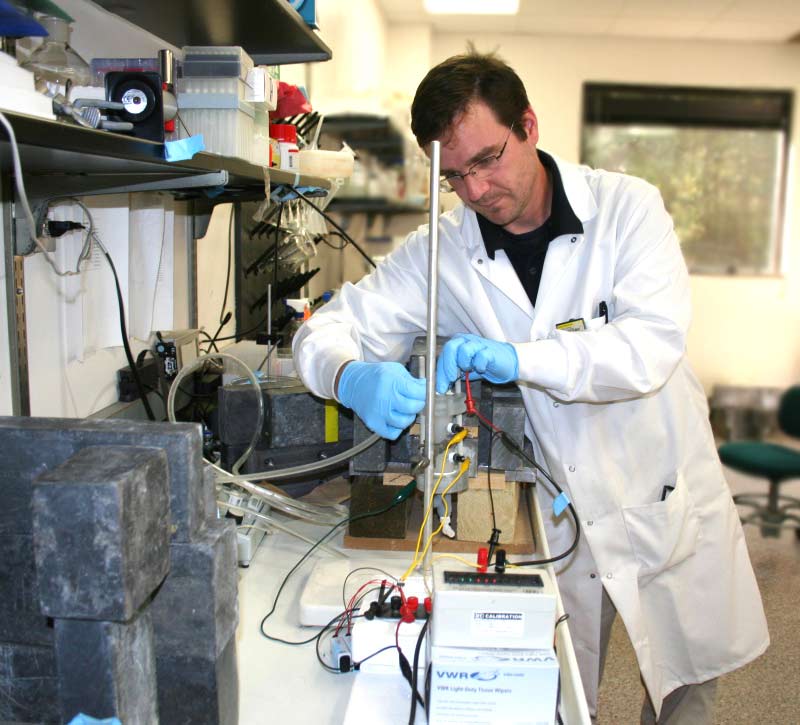Research Focus on Dr. Brian Powell
Dr. Brian Powell, Clemson University, is the principal investigator of the project “Radionuclide Waste Disposal: Development of Multi-scale Experimental and Modeling Capabilities” which is funded as an Implementation Award through the Department of Energy (DOE), Experimental Program to Stimulate Competitive Research. This is a $5.25 million grant that pays for three years of research into finding the safest ways of storing nuclear waste. As principal investigator on the grant, Powell is leading a team of more than 20 researchers from across the state including collaborators at the University of South Carolina and South Carolina State University.
This project addresses scientific issues limiting the understanding of radionuclide behavior in natural and engineered systems. Clean-up of millions of gallons of legacy nuclear waste in underground storage tanks and millions of cubic yards of radionuclide contaminated soils at DOE legacy weapons production sites is hindered by incomplete understanding of radionuclide migration in porous media (i.e., waste forms and subsurface environments). The heterogeneity and inaccessibility of these systems creates fundamental challenges in our ability to understand the interactions between the physical, chemical, and biologic processes that control radionuclide transport in complex environments. We have built an outstanding team of scientists and engineers from across South Carolina that are uniquely capable of approaching these problems from a perspective that integrates traditional experimental and modeling efforts with multi-modal imaging and sensing technologies that can provide insights to processes occurring below the scale typically assumed for a representative elementary volume (e.g., the scale of an experimental column or model grid cell).
This project is critical to the environmentally sustainable economic development of South Carolina. Today in South Carolina, ~50% of the electrical power utilization is from nuclear power plants – seven power plants in the state and an additional six close to the South Carolina borders. Furthermore, two nuclear power reactors are currently under construction in South Carolina as well as Georgia. South Carolina is also home to the DOE Savannah River Site (SRS), a commercial low-level radioactive waste disposal facility, and a commercial nuclear fuel fabrication facility. Thus, the setting is ideal for South Carolina to emerge as an international leader in advancing environmental monitoring, remediation, and disposal of radioactive contaminants. In addition to the environmental and economic context of the State, our EPSCoR team has an unparalleled set of academic research facilities available to meet these challenges, including world-class imaging, computational, and actinide geochemistry labs that are uniquely licensed to work with a wide range of radionuclides.
Analytical and computational tools are required which can identify source terms for contaminants in geologic disposal scenarios, determine the chemical speciation of contaminants, delineate the biogeochemical and physical processes by which contaminant transport is manifested, and predict contaminant mobility across wide temporal and spatial scales. New experimental and modeling systems are required to examine radionuclide migration in real time and in complex systems. Examining radionuclide migration across multiple spatial and temporal scales and in multiple dimensions will provide necessary understanding of the impact of heterogeneity and provide more technically defendable and reliable reactive transport and risk assessment models.
This material is based upon work supported by the U.S. Department of Energy Office of Science, Office of Basic Energy Sciences and Office of Biological and Environmental Research under Award Number DE-SC-00012530. The project started in late 2014 and will submit a competitive renewal proposal in August 2017 for an additional three years.
Project Title: Radionuclide Waste Disposal: Development of Multi-scale Experimental and Modeling Capabilities. Click here to read the DOE EPSCoR Project Abstract.
Click download PDF of Research Focus on Dr. Brian Powell
August 4, 2017